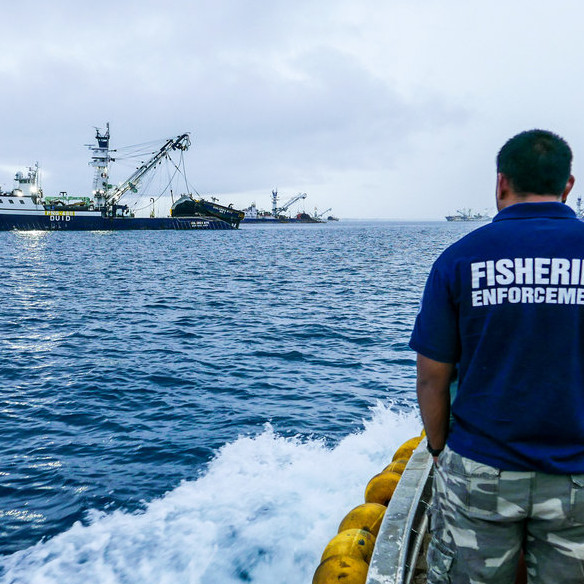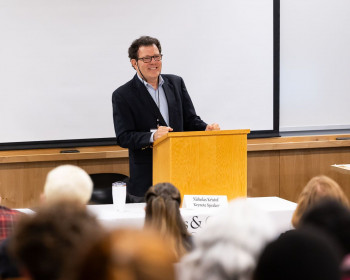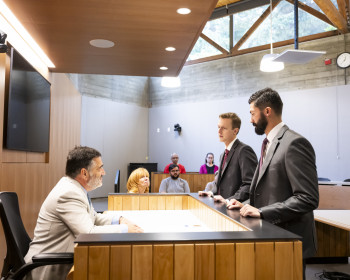Connecting Human Trafficking and Commercial Fishing
Professor Chris Wold’s report has global repercussions as it uncovers how large international fishing vessels confine workers onboard with no way to leave.
Open gallery

Implementing PSM in Majuro, the busiest tuna transhipment port in the Pacific.
Crew on a Purse Seiner
Controlling Transshipments
As many as 100,000 people are enslaved on fishing vessels around the world. Isolated at sea, many fishers are unable to escape brutal beatings and inhumane work and living conditions. Lewis & Clark Law professor Chris Wold has been advocating for the Western and Central Pacific Fisheries Commission (WCPFC), which manages the largest tuna fishery in the world, to prevent these human rights violations.
WCPFC member governments have been pressing to address the issue, and it has garnered interest from external parties. Working with the World Wildlife Federation (WWF) and Korea’s Citizens Institute for Environmental Studies (CIES), Professor Wold submitted a report to the WPCFC refuting China’s argument that the International Labour Organization, not the WCPFC, is the appropriate forum for adopting binding labour standards for fishing crews.
Focused on the Pacific Ocean, Wold’s report also details how—and why—human trafficking occurs in the industry. Slim profit margins and known fixed costs for vessel maintenance, fuel, and gear, drive commercial fisheries to cut the one factor within their control: wages.
Other factors create the conditions that the United Nations has coined “modern slavery.” Fishing vessels offload their catch onto refrigerated cargo vessels on the high seas, avoiding the prying eyes of inspectors who might witness human rights abuses. In many circumstances, including those involving migrant workers on U.S.-flagged tuna vessels fishing out of Honolulu, fishers are forced to surrender their passports, giving them no option to leave the vessel; stepping off the ship subjects workers to deportation and associated charges.
Professor Wold’s report found immediate readership among WFCPF’s 27 member nations, seven participating territories, and nine co-operative non-member nations; it was also reported on by various international news media outlets.
Professor Wold, WWF, and CIES have been using Wold’s report to influence negotiations on a binding regulation to eliminate human rights abuses on fishing vessels operating in waters managed by the WCPFC. Already, the draft regulation has evolved to recognize the WCPFC’s authority to address human rights abuses on fishing vessels. Wold had hoped the WCPFC would adopt the regulation at its December 2021 meeting. Like so many issues, however, the pandemic has delayed any final action until 2022.
Nonetheless, Wold remains optimistic. “These are the biggest fisheries on the planet, worth billions of dollars and covering 20% of Earth. If we can make progress here, I am sure other fisheries organizations will take note.” Wold said. “We are finally getting broader awareness that fisheries organizations can tackle human rights abuses, but we need to see the political will.”
In the interim, he hopes more people make informed choices about the food they eat and the repercussions of how consumer power can drive industry to do better.
Law Communications is located in room 304 of Legal Research Center (LRC) on the law Campus.
MSC: 51
email jasbury@lclark.edu
voice 503-768-6605
Cell: 626-676-7923
Assistant Dean,
Communications and External Relations, Law School
Judy Asbury
Law Communications
Lewis & Clark Law School
10101 S. Terwilliger Boulevard MSC 51
Portland OR 97219

